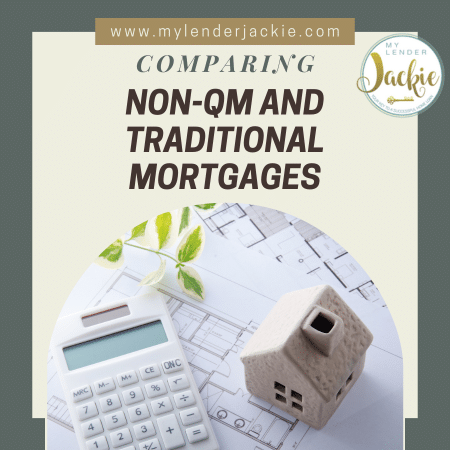There are many different types of mortgages, including non-QM mortgages. One of the most complicated parts of the home buying process is determining what type of mortgage is the right fit for you. Choosing the terms that work for your needs, and then making sure you qualify, might feel overwhelming at first, but it doesn’t have to be.
When you’re working with a mortgage lender who has years of experience and has a track record of finding creative financing solutions, like we do, you can lean on the expertise of your loan officer and relax through the process.
We can help you find the financing that meets your unique needs, so talk with one of our loan officers any time. If you’re looking for more information to understanding the different between traditional mortgages and non-QM loans, this is the post for you. Keep reading to learn more and reach out to us any time with your questions.
 What is a non-QM loan?
What is a non-QM loan?
A Non-Qualified Mortgage (Non-QM) loan is a type of mortgage that does not meet the standards set by government-sponsored entities such as Fannie Mae and Freddie Mac or the guidelines established by the Consumer Financial Protection Bureau (CFPB) for Qualified Mortgages (QM). Unlike traditional mortgages, which must adhere to strict underwriting criteria and eligibility requirements, Non-QM loans offer more flexibility in qualification criteria, allowing lenders to consider a broader range of borrower profiles and financial situations.
Simply put, a non-QM loan gives more flexibility to us as the lender so that we can work to find a financing solution that works for you. There are a few different types of non-QM loans, including bank statement loans, cash flow investor loans, and stated income loans.
Underwriting Standards
One of the most significant distinctions between a traditional and non-QM loan is the difference in underwriting standards.
Traditional Mortgages
Traditional mortgages, also known as Qualified Mortgages (QM), must meet specific criteria outlined by government regulations. Lenders adhere to strict underwriting standards concerning borrower credit scores, debt-to-income (DTI) ratios, employment history, and documentation requirements. While you might find some variation between lenders, we are all required to stick to the national regulations. These loans typically require extensive documentation of income, assets, and liabilities to demonstrate the borrower’s ability to repay the loan.
Non-QM Loans
Non-QM loans do not conform to the standard underwriting guidelines of QM loans, providing more flexibility for borrowers who may not meet traditional qualification criteria. Non-QM lenders consider a broader range of factors when evaluating borrower eligibility, including alternative income sources, credit history, and unique financial circumstances. That’s what makes these loans so ideal for self-employed individuals, investors, retirees, or borrowers with non-traditional income sources.
Income Verification
In any loan application, the lender is going to look at your ability to repay the loan. This process will vary between the two types of loans, though.
Traditional Mortgages
Traditional mortgages will require full documentation of income, including W-2 forms, pay stubs, tax returns, and employment verification. In most cases, we are looking for stable, verifiable sources of income to assess borrower eligibility and ability to repay the loan.
Non-QM Loans
Non-QM loans offer alternative methods of income verification for borrowers who may have difficulty documenting income through traditional means. These loans may allow for bank statements, asset depletion, or stated income documentation to verify income sources. In a cash flow loan, you won’t even need to show your income because the loan is approved based on the income potential of the investment property. We consider a borrower’s overall financial profile rather than solely relying on traditional employment income.
Credit Scores
It’s no secret that your credit score plays a major role in your eligibility for a mortgage. Here’s how that will differ between the types of loans.
Traditional Mortgages
Traditional mortgages typically have stringent credit score requirements, with lenders seeking borrowers with excellent to good credit histories. Borrowers with lower credit scores may face challenges qualifying for conventional loans or may be required to pay higher interest rates and fees. These limits can vary slightly from lender to lender, but they are mostly set my the national standard.
Non-QM Loans
Non-QM loans may accommodate borrowers with less-than-perfect credit or unique credit histories. While credit scores are certainly still a factor in Non-QM lending decisions and worth paying attention to, we are sometimes able to be more lenient in our credit score requirements and consider other compensating factors such as a sizable down payment, significant assets, or a history of timely rent payments.
Property Types
The type of real estate you are looking to buy will also determine which type of mortgage is right for you.
Traditional Mortgages
Traditional mortgages typically finance primary residences, second homes, and investment properties that meet standard underwriting guidelines and property standards. You may have restrictions on certain property types or occupancy types for conventional loans.
Non-QM Loans
Non-QM loans can finance a wider range of property types, including non-warrantable condos, mixed-use properties, vacation homes, and investment properties. These loans can help to accommodate borrowers seeking financing for unique or unconventional properties that do not qualify for traditional mortgages, especially investment properties.
We know there is a lot to consider when you’re applying for a loan, and we are here to help. Ready to learn more about applying for a mortgage? We’re here to help, so contact us any time.

